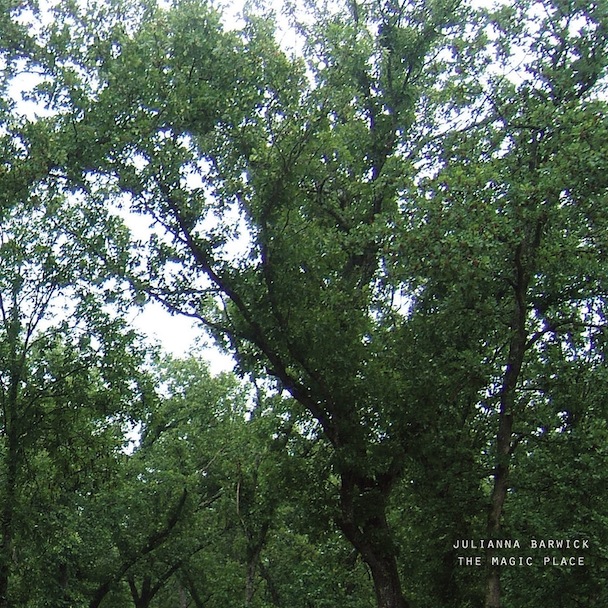Sanguine and Florine were gorgeous, fragile records, like bendable glass floating through a heavy breeze. Largely a capella, they soothed the listener out of any initial disorientation he might have felt upon first encountering Julianna Barwick’s echoing walls of wordless vocal tones.
Now of course, I still enjoy those two releases (from 2006 and 2009, respectively). Their inherent quality hasn’t changed. But Barwick’s latest album, The Magic Place, finds the Brooklyn-based singer imbued with a newfound, pious confidence, and the results—nine spacious, ghostly, rather pastoral tracks—are each superior in both melody/harmony and songwriting to anything Barwick has released before.
Happily, that confidence never translates into arrogance. Instead, a hushed reverence hovers over every melodic phrase, every ambient keyboard sweep and trickle of piano, every soft drop of percussion and application of bass. Note the album cover: we’re staring up at these trees, as though kneeling before an altar.
And so “Envelop” opens the album with a feminized Gregorian chant backed by the barest use of the thinnest synth. Despite their sparse instrumentation, each of the songs on The Magic Place sound remarkably full; these are rich, vibrant tones, dipped in ambrosia and served down from the cosmos. They shimmer, but they’re not ethereal. This is timeless music; 500 years ago, I’m convinced they would have loved this.
The range of sounds Barwick elicits from her own voice is undeniably impressive. “White Flag” is cinematically tribal, like The Lion King; “Prizewinning” is achingly quixotic, sort of like a gentler version of ABBA’s “Fernando.” I understand that Disney movies and Swedish pop seem like rather gaudy reference points for an ambient vocal undertaking, but the delicate timbre of Barwick’s singing voice grounds even the poppiest moments in a magical realism that any fan of the Cocteau Twins or even Beach House would appreciate. This is especially evident on “Vow,” which couples a haunting piano loop with a vocal performance that sounds directly inspired by Elizabeth Fraser.
That said, the album’s strongest songs play off Barwick’s complicated relationship with the religion she grew up with as a child but has come to distance herself from in her adulthood, as she explained to us in an interview earlier this year. The title track would befit a church choir in both harmony and melody, while closer “Flown” sounds hymnal in its poignant spiritual catharsis and downright religious in its measured repetition. And just as religion—or perhaps, more appropriately, agnosticism—places faith in an intangible higher power, so too does Barwick’s voice seem reverent of some supernatural force, something hiding in the branches of the leafy trees and dancing around the edges of the sunrays that obscure your vision on a bright afternoon. Is she singing lyrics? Hard to say. But these songs are unquestionably emotive, and I wouldn’t be surprised if they were actually prayers. Frankly, it seems like a mystery we’re meant to accept instead of solve. Like magic.


